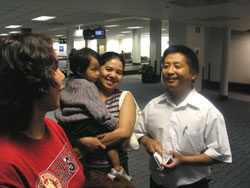A welcoming presence: Refugee advocate embraces people seeking help, hope

Welcoming Burmese refugees to the United States and Indianapolis, such as these two women and a child, has been a common occurrence this spring and summer for Thlasui “Sui” Tluangneh. As a resettlement specialist for the refugee program of Catholic Charities Indianapolis, Sui knows
personally the political suppression that drove the refugees to flee from Burma in the hope of a
better life in America.
By John Shaughnessy
He stands to the side for a moment, savoring another reunion of family and friends at Indianapolis International Airport.
It’s the second time he has been to the airport this day, the fourth time in four days, and yet he never tires of watching the smiles of recognition, the tight hugs and the tears of joy from the refugees who can’t believe they have finally arrived in the United States, giving them the hope of a new life in a new land.
As he watches, Thlasui “Sui” Tluangneh can’t stop smiling either, even though he knows his work is just beginning in helping the latest round of refugees from Myanmar, also known as Burma, adjust to life in America. All this spring and summer, Burmese refugees have been arriving increasingly in Indianapolis—a swell that is expected to reach a total of 300 to 500 people by the end of the year.
“They’re excited to see friends and relatives,” says Sui, a resettlement specialist for the Refugee Resettlement Program of Catholic Charities Indianapolis. “Sometimes they cry. Sometimes they lose control. All tonight, they will talk. No one sleep. It is nice.”
It is also far from the Southeast Asian country that was once their home, a home they fled because of the political suppression of the military regime there.
The most recent refugees from Burma join the nearly 600 refugees from that country who have already made a home in Indianapolis. Most of them are from an ethnic group that’s called Chin.
“In 2001, we resettled 133 refugees from Burma,” says Joyce Overton, the longtime director of the archdiocesan Refugee Resettlement Program. “That’s how I learned there was already a small Chin community here. They already had a church here, and they agreed to help with resettling the 133 people.
“Earlier this year, we were told that large numbers would come in. We went back to the Chin community and said, ‘Can you help?’ By this time, the Chin community has grown to more than 500 people and there are seven churches on the southside. I love working with the Chin community because they do come together. They all help and support one another. That’s what the refugees know. They know there’s a community here.”
Sui nods in agreement. He says that the news of how Burmese refugees are accepted and supported in Indianapolis has spread to the refugee camps in Malaysia, India and Thailand.
“We are very close to one another,” he says. “When someone’s father dies back home, we go to the home right away. We know each other.”
Sui also knows personally what it means to fear for your life in your homeland. It was part of his past in Burma.
He was involved in student protests in
that country in 1988, the year when the
military regime killed an estimated 8,000
to 10,000 people while crushing a
pro-democracy movement.
“In Burma, there’s no more election after 1990,” he says. “Military government put
generals and captains in different areas. Everywhere, military people rule. There’s persecution, imprisonment. There is suspicion all around. A lot of people need to leave the country.”
Sui finally left in 1999, coming to the United States to study at a Bible college in Ohio. Yet even while he was in America, the military came to his home in Burma, asking questions about him.
“Things got worse and worse,” he says. “After a year, I applied for asylum. I asked for refuge. Within one year, they grant me.”
The United States has been his home ever since. The father of six brought his family to Indianapolis in 2004. He has provided help to arriving Burmese refugees ever since.
“He is very good, wonderful,” says Thawng Ling, pastor of the Chin Evangelical Baptist Church in Indianapolis.
In March, Overton hired him to assist
the Catholic Charities refugee program, believing he would help tremendously with the influx of Burmese refugees.
“We’re glad to have him here,” she says.
Sui’s constantly quick smile shows he enjoys his role of helping refugees adjust to their new world, their new life.
“It is a noble job,” he says. “Back in Burma, my parents were poor. A lot of people were kind to help us. My attitude becomes, ‘I should help people in my life.’ I’m much better with the language. I’m the one who arrived before they did. I have knowledge—how to buy a car, how to buy a house, how to apply for a job.”
He pauses, taking a break from helping the 10 new refugees who have just arrived at the airport.
“I’m very busy, but I’m helping so I’m happy,” he says. “I’m very happy.” †
